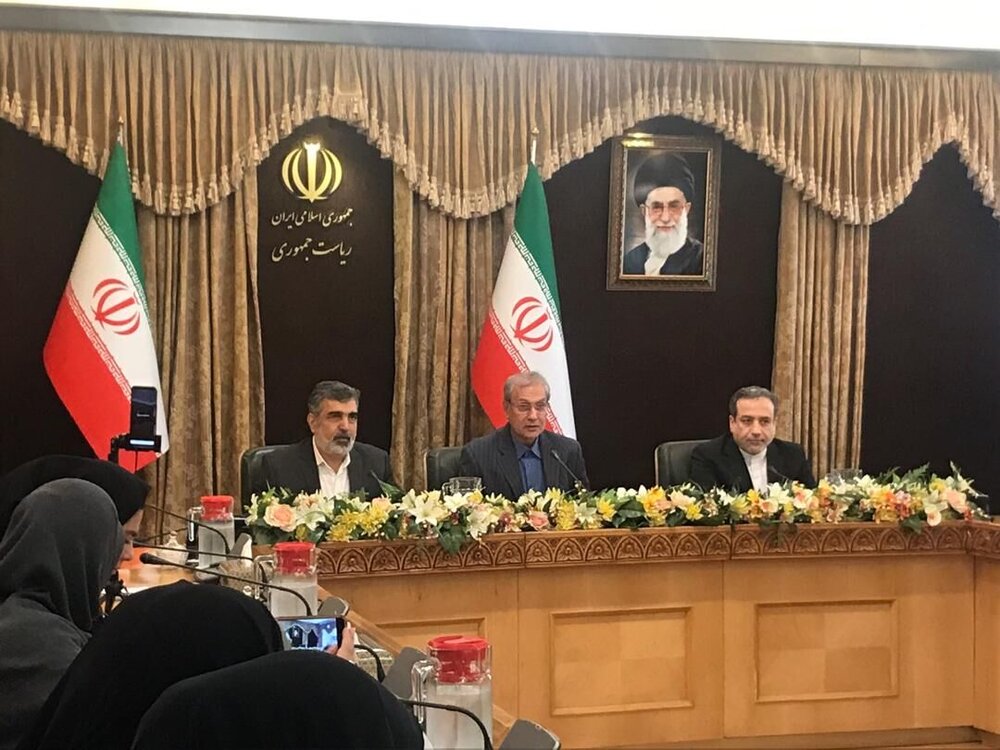Iran starts enriching uranium to above 3.67%

TEHRAN – As the Europeans missed a two-month deadline to devise a concrete economic and financial mechanism to protect Iran from the harsh U.S. sanctions, Iran officially announced on Sunday, July 7, that it is starting to enrich uranium to a higher purity than the 3.67%.
The announcement was made in a joint news conference by Deputy Foreign Minister Abbas Araqchi, government spokesman Ali Rabiei, and Atomic Energy Organization spokesman Behrouz Kamalvandi in Tehran.
Iran’s chief demand is that Tehran be permitted to export crude oil at the same levels before the U.S. reimposed sanctions.
Under the 2015 nuclear deal, officially called the JCPOA, Iran had agreed to put limits on parts of its nuclear activities in exchange for the termination of all economic and financial sanctions.
The special mechanism introduced by Europeans, known as INSTEX, only allows sale of food and medicine to Iran, items which are not subject to sanctions.
The step taken by Iran on Sunday was the second of its kind. In the first step announced on May 8, Iran announced that it will not sell its stockpile of enriched uranium enriched to 3.67 percent.
The JCPOA allowed Iran to keep 300 kilograms of uranium enriched to 3.67%. However, last Monday Iran announced that its stockpile of uranium has exceeded the 300kg limit.
Iran says it is limiting its commitments based on paragraph 36 of the nuclear deal. Paragraph 36 provided a mechanism to resolve disputes and allows one side, under certain circumstances, to stop complying with the deal if the other side is out of compliance.
“Iran increasing enrichment level to power nuclear plants”
During the presser, Kamalvandi said Iran is increasing uranium enrichment from the current 3.67% to a level that fulfills the needs of its power plants.
“This was a measure the Islamic Republic had in mind and also declared previously,” he said.
Kamalvandi also said Tehran has not yet decided on the level of enrichment for the Tehran research reactor.
The Tehran reactor is powered by nuclear fuel enriched to a purity of 20 percent.
On May 8, Iran’s Supreme National Council (SNSC) declared Tehran’s exit from “certain” obligations under the landmark agreement and gave a 60-day deadline to the remaining JCPOA signatories to protect Iran’s interests against U.S. sanctions, or it will restart enriching uranium to a higher degree.
It came exactly a year after President Donald Trump withdrew the United States from the JCPOA. The exit followed by introducing the harshest ever sanctions on Tehran in a clear violation of the UN Security Council resolution 2231 and pressuring other countries to violate the same resolution by cutting economic ties with Iran.
During the press conference, Rabiei criticized the U.S. revocation of the nuclear deal, saying, “Today, all those who are adhering to world peace are concerned about the United States’ actions.”
He said the U.S. aimed to disrupt social order in Iran by exiting the JCPOA. “Therefore, our big solution is social cohesion.”
Saving JCPOA is a principle for Iran, but it depends on other sides’ actions
The government spokesman also said Iran will not remain in the nuclear agreement “at any price”.
“Today, any action we take regarding [uranium] enrichment is to save the JCPOA,” Rabiei insisted. “Saving the JCPOA is a principle for us, but it depends on the other sides’ actions.”
Araqchi said Iran has reconsidered its commitments regarding the level of uranium enrichment program and “we announce that we no longer adhere to this commitment.”
According to Araqchi, Foreign Minister Mohammad Javad Zarif was to send a letter to European Union foreign policy chief Federica Mogherini on Sunday to openly declare the articles of the JCPOA, to which Iran would no longer adhere.
In a post on his Twitter page on Sunday, Zarif said Iran’s steps in reducing nuclear commitments are “reversible” only if the European parties to the nuclear deal (France, Germany and Britain, also called E3) honor their commitments for trade with Iran.
60-day contingencies
“We would give another 60-day deadline, after which we will continue reducing our commitments [to the deal,” Araqchi said.
Araqchi told reporters that Tehran would continue its contacts with the European parties to the deal in order to find a solution “otherwise after 60 days we will take the third step as well.”
The remaining members of the JCPOA are the four permanent members of the UN Security Council – France, Britain, Russia and China - and Germany, commonly referred to as 4+1.
“The U.S. has withdrawn from the JCPOA and cannot use any of its mechanisms, but it can attend the P4+1 meetings on the said conditions. Our first condition is [the lifting of] oil and banking sanctions,” said Araqchi, who was a senior negotiator in the talks that led to the JCPOA.
He also said Iran had planned out 60-day contingencies for every European failure to meet Iranian demands and could potentially ultimately scrap the deal altogether.
On Trump’s repeated calls for rewriting the nuclear deal, the senior diplomat underlined that the deal would under no circumstances be renegotiated and that it should be implemented precisely as it is.
Iran able to redesign Arak reactor
The deputy foreign minister also noted that Iran was holding talks with Chinese and English officials regarding the redesign of Arak reactor, which the U.S. had originally undertaken to carry out under the JCPOA. He said those talks were proceeding for now but added that Iran has the will and technology to redesign the reactor on its own if the talks failed to produce favorable results.
MH/PA
